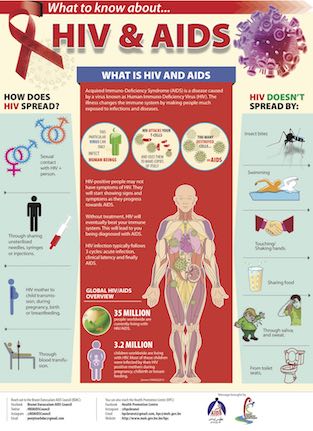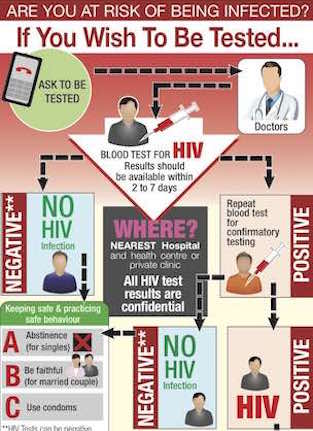INFOGRAHICS ON HIV AND AIDS


ANSWERS ON QUESTIONS ASKED ABOUT HIV & AIDS
Acquired Immuno-Deficiency Syndrome (AIDS) is a disease caused by a virus known as Human Immuno-Deficiency Virus (HIV). The illness changes the immune system by making it easier for you to get sick. HIV is the virus that causes HIV infection. AIDS is the most advanced stage of HIV infection.
The only way to know for sure whether you have HIV is to get tested. Knowing your status is important because it helps you make healthy decisions to prevent getting or transmitting HIV.
HIV-positive people may not have symptoms of HIV. They will start showing signs and symptoms as they progress towards AIDS. Without treatment, HIV will eventually beat your immune system. This will lead to you being diagnosed with AIDS.
Some people may experience a flu-like illness within 2 to 4 weeks after infection (Stage 1 HIV infection). But some people may not feel sick during this stage. Flu-like symptoms include fever, chills, rash, night sweats, muscle aches, sore throat, fatigue, swollen lymph nodes, or mouth ulcers. These symptoms can last anywhere from a few days to several weeks. During this time, HIV infection may not show up on an HIV test, but people who have it are highly infectious and can spread the infection to others.
If you have these symptoms, that doesn't mean you have HIV. Each of these symptoms can be caused by other illnesses. But if you have these symptoms after a potential exposure to HIV, see a health care provider and tell them about your risk.
When people get HIV and don't receive treatment, they will typically progress through three stages of disease. Medicine to treat HIV, known as antiretroviral therapy (ART), helps people at all stages of the disease if taken the right way, every day. Treatment can slow or prevent progression from one stage to the next. It can also dramatically reduce the chance of transmitting HIV to someone else.
HIV infection typically follows 3 cycles:
Testing is a good idea if you’ve had unprotected sex or if your partner tests positive for HIV. You should also get tested if you are diagnosed with a sexually transmitted infection (STI) such as chlamydia, gonorrhoea or syphillis and also if you’ve shared needles with anybody (for injections, piercings, tattoos, etc.). If you’re pregnant, get tested for HIV at your first prenatal visit. Your blood would also be automatically screened for HIV if you donate blood.
Luckily, HIV testing is pretty easy and painless. The best part about getting tested for HIV? Once you get it over with, it can really put your mind at ease. And if you DO have HIV, it’s best to find out right away so you can take medication to help you stay healthy and lower your chances of spreading HIV to others.
After you get tested, it's important to find out the result of your test so you can talk to your health care provider about treatment options if you're HIV-positive or learn ways to prevent getting HIV if you're HIV-negative.
To find places near you that offer HIV testing,
Visit www.moh.gov.bn/Pages/BruneiFacilities.aspx, or
You can get confidential HIV testing at all Government Health Centres or Pusat Kesihatan and many private clinics including JPMC
No effective cure currently exists for HIV. But with proper medical care, HIV can be controlled. Treatment for HIV is called antiretroviral therapy or ART. If taken the right way, every day, ART can dramatically prolong the lives of many people infected with HIV, keep them healthy, and greatly lower their chance of infecting others. Before the introduction of ART in the mid-1990s, people with HIV could progress to AIDS (the last stage of HIV infection) in a few years. Today, someone diagnosed with HIV and treated before the disease is far advanced can live nearly as long as someone who does not have HIV.